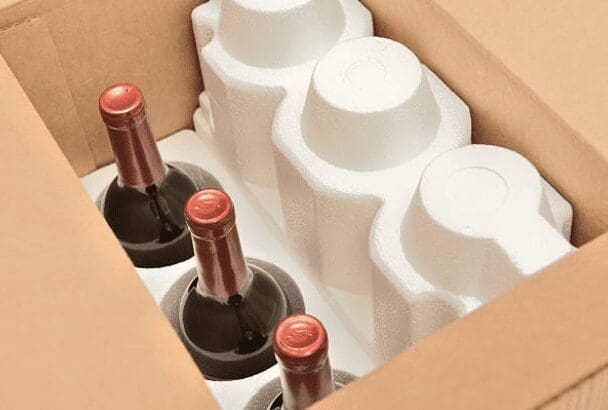Lots of packages are arriving on the doorsteps of Delawareans.
None are permitted to contain a certain adult beverage, and a group of state legislators say it’s time Delaware caught up with changes that happened elsewhere in the nation in the 20th Century and allowed it.
Nearly 98% of Americans can have wine shipped to their homes, but in the First State, that’s illegal.
Utah and Mississippi are the only other states where it’s outlawed – and this may be the rare occasion politicians are NOT saying “Thank God for Mississippi.”.
A bipartisan group of state legislators plan to offer two bills to change the laws..
Right now, Delawareans must buy wine at liquor stores.
No alcoholic beverage can be ordered by a Delaware consumer for shipment directly to their residence, according to Joseph Fulgham, director of policy and communications for Delaware House Republicans.
Those who want wine not found in local stores can only legally obtain it through a process that forces all sales of beer, wine and other alcohol through a system of distributors, wholesalers and retailers established following the repeal of Prohibition 90 years ago.
“It’s an antiquated protocol that makes distributors and retailers the gate-keepers of all beer, wine and spirits sales,” Fulgham said.
The state will allow a winery to ship a bottle of wine if the customer purchases the product at a winery.
However, the same customer is barred from ordering the same wine by phone or online.
House Bill 262, sponsored by Rep. Mike Smith, R-Pike Creek, seeks to modernize Delaware law by allowing direct-to-consumer wine sales under the following conditions:
- Carriers like FedEx and UPS would need to obtain special licenses to handle wine shipments
- Wine shipments would need to be specially labeled
- Wineries shipping their products to Delaware would need a state license
- Pay the same state alcohol taxes levied on retail sales
- Restrict deliveries to adults over the age of 21, who must sign for the package
- Limit households to no more than three cases of wine per year
- Not allow the re-sale of shipped wine
Smith and other supporters of the bill state that the legislation would not result in any lost sales for Delaware package stores. In the states that have enacted similar laws, retail sales have gone up after the laws took effect.
Another proposed bill aims for an even broader modernization of alcoholic beverage sales.
House Bill 259, sponsored by Rep. Jeff Spiegelman, R-Townsend-Clayton, would allow farm breweries, microbreweries, and craft distilleries to conduct direct-to-consumer sales of wine, beer, spirits, mead and hard cider.
Spiegelman’s bill also would allow state liquor stores to conduct home deliveries, while requiring the licensing and training of delivery workers, and mandating that those receiving the order are identified and at least 21 years old.
The sponsors expect their opposition to claim that will encourage underage drinking.
Not so, said Chuck Nunan, owner of the Harvest Ridge Winery in Marydel.
Carrier services have so many checks and balances that wouldn’t happen, he said.
The state needs to reform its obsolete alcohol sales laws to reflect 21st-century consumerism, he said.
“Consumer buying habits have changed,” he said, citing Amazon, Chewy and Walmart. “You order it online and it shows up at your doorstep.”
More than 85% of state residents support direct-to-consumer sales for alcoholic beverages, and about 63% believe alcohol retailers should be able to make deliveries, according to a survey of 500 Delawareans commissioned by the Delaware Wineries Association and conducted by the University of Delaware.
“Delawareans can already have all manner of goods shipped directly to their homes, including sensitive items, like prescription drugs,” he said. “What these measures propose would not place Delaware on the cutting edge, but largely just bring us up to speed with what’s already in practice elsewhere.”
There are plenty of apps and online services that facilitate home delivery of alcohol such as Drizly, Winc and others that are partnered with thousands of retailers and cities across the country to deliver adult beverages.
“Direct-to-consumer and home delivery provide greater consumer convenience, with the latter also potentially improving safety on our roads,” Spiegelman said. “Allowing someone who may have already been drinking to order a beverage delivery is preferable to having them get behind the wheel.”
Both HB 262 and HB 259 are pending action in the House Economic Development/Banking/Insurance & Commerce Committee.
The General Assembly reconvenes Jan. 9.

Raised in Doylestown, Pennsylvania, Jarek earned a B.A. in journalism and a B.A. in political science from Temple University in 2021. After running CNN’s Michael Smerconish’s YouTube channel, Jarek became a reporter for the Bucks County Herald before joining Delaware LIVE News.
Jarek can be reached by email at [email protected] or by phone at (215) 450-9982. Follow him on Twitter @jarekrutz
Share this Post





